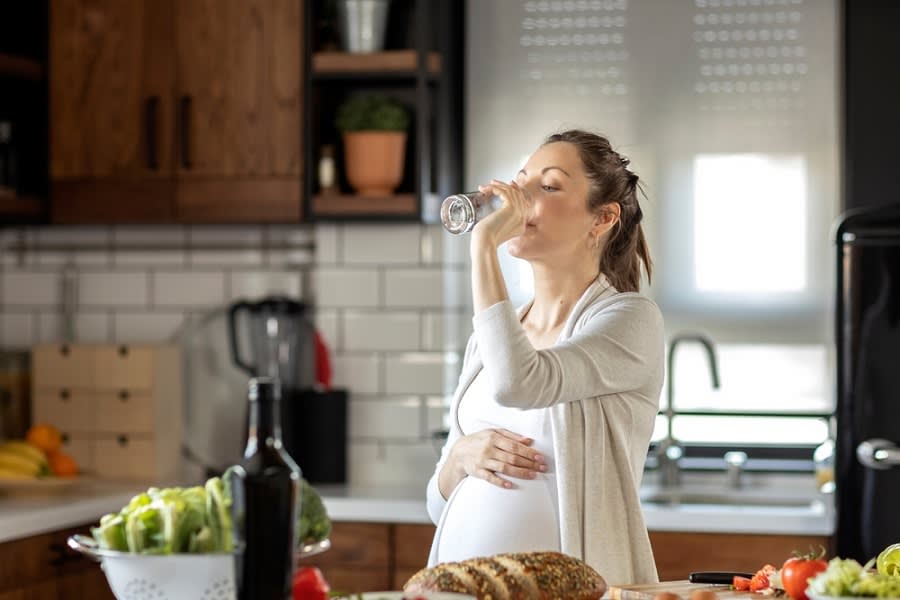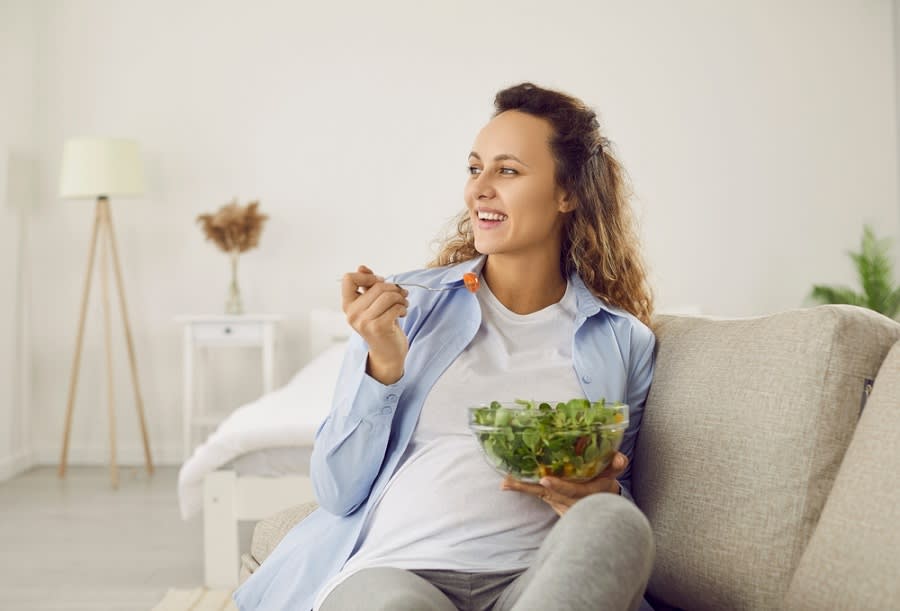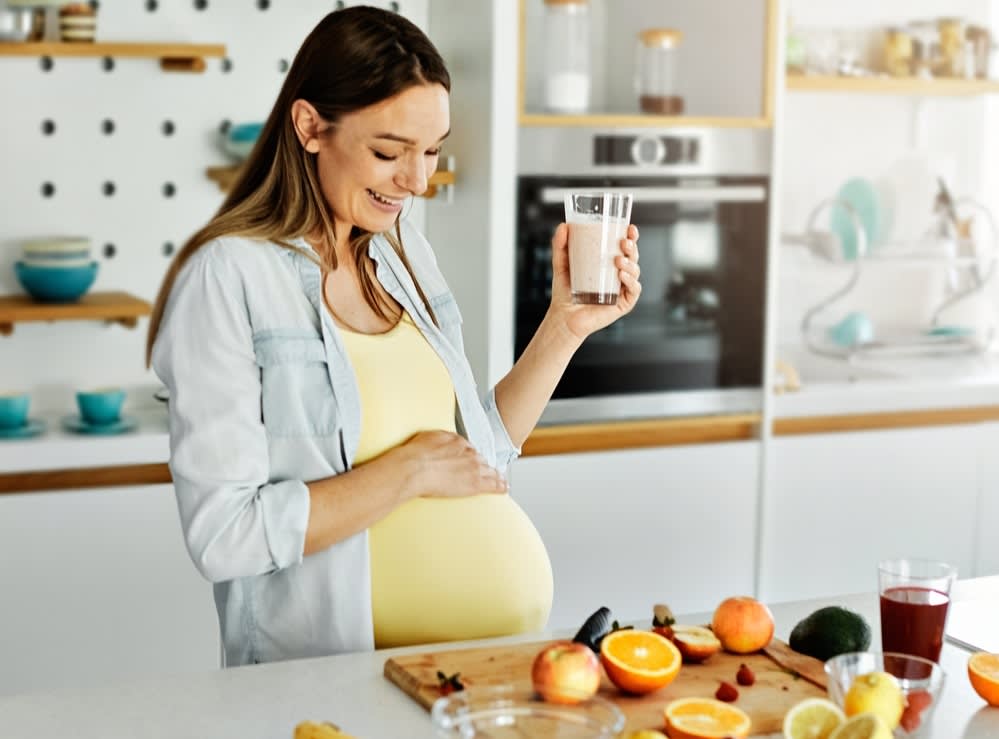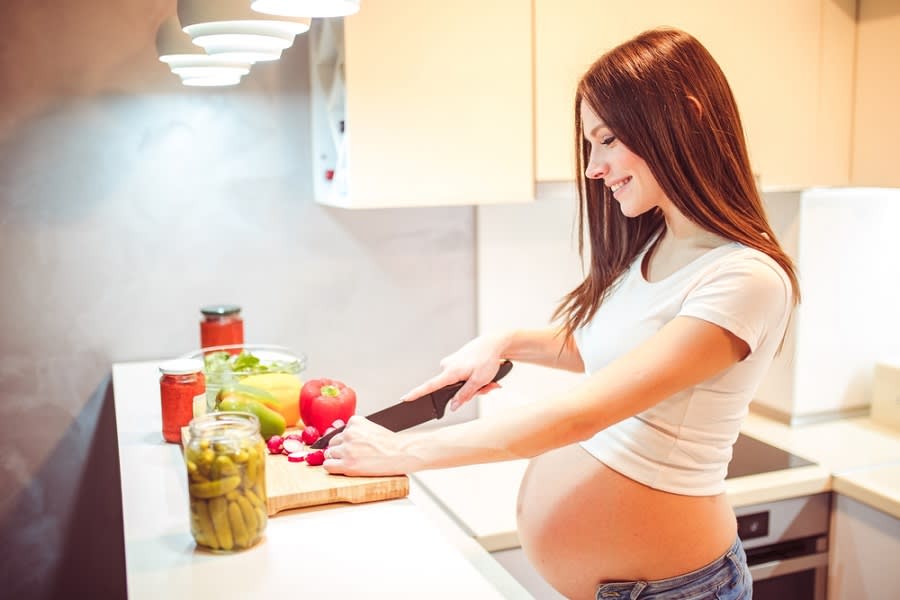As such, prepping meals in advance can help you avoid dangerous mistakes. Thankfully, there are various meal delivery services that can eliminate the stress of having to do this yourself.
Aside from that, to keep you and your little one safe, here are 10 things to avoid eating and drinking while pregnant and plenty of suitable alternatives.
» More: Check out our top 10 picks for foods to boost your immune system.
1. Caffeinated Drinks and Sodas
As it is a strong stimulant, caffeine foods to avoid during pregnancy include coffee, tea, energy drinks, and even sugary sodas.
You should definitely avoid caffeine during pregnancy. Caffeine intake can affect your unborn baby, increasing fetal catecholamine levels, fetal heart rate, and placental vasoconstriction. If the fetus' oxygen uptake is impaired, it can be fatal. Caffeine can cause birth defects, premature labor, preterm delivery, and an increased risk of low birth weight (1).
What to Drink Instead:
It’s advised to limit your caffeine intake to 200 milligrams a day—the less the better. When you feel thirsty, have water, fruit juice, and green smoothies that are refreshing and nutritious while offering many essential vitamins and minerals that are good for fetal growth. Use plenty of spinach in your green smoothies for the following nutrients:
- Iron—essential for a healthy blood supply to your baby
- Potassium—helps maintain the balance of fluids and electrolytes
- Fiber—promotes heart health and digestion

2. Unpasteurized Cheese
Cheese is highly beneficial for pregnant women as it is rich in calcium.
But why can't pregnant women eat soft cheese? Soft cheeses to avoid during pregnancy, such as Danish blue cheese and camembert, can be infected with bacterial diseases like E. coli or listeria, both of which can cause food poisoning. Listeria also causes flu-like symptoms that might not be life-threatening to grown-ups but can be severely dangerous for unborn babies.
What to Eat Instead:
Have pasteurized cheeses in pregnancy (like cheddar) as they are high in calcium and completely free of harmful microbes. Not only are they safe, but they also contain 492% more calcium than milk. You can also get the calcium you need from pasteurized animal milk—like cow and goat—and plant-based milk such as soy, almond, and coconut.
Soft, mold-ripened, unprocessed cheese, is full of harmful microbes, which is why you should heat it before consuming it.
» Tired of getting heartburn? Here are the worst foods for acid reflux.
3. Raw or Lightly Cooked Sprouts
How to figure out what you should be eating is no easy task during pregnancy.
For example, sprouts are considered a superfood because of their high content of folate, magnesium, manganese, phosphorus, and vitamin K. Folate is essential during pregnancy, especially in the first trimester as it can help prevent major birth defects such as anencephaly and spina bifida.
Bean sprouts are high in antioxidants, vitamin C, calcium, and other essential nutrients that play a major role in the health of the baby as well as the mother. Alfalfa sprouts are high in vitamin K, vitamin C, and other powerful antioxidants. Mung bean sprouts contain vitamins, minerals, and beneficial enzymes that have antioxidant and anti-inflammatory activity. They help maintain healthy blood pressure and blood glucose levels.
However, raw or lightly cooked bean sprouts while pregnant can cause problems. According to the US Food and Drug Administration, pregnant women should limit their consumption of legume sprouts. They can be a hub of disease-causing bacteria such as salmonella, listeria, and E. coli (2).
What to Eat Instead:
To enjoy the nutritional benefits of sprouts without compromising your baby’s health, simply cook them well. Use cooked sprouts in salads, hot soups, and stir-fries. Alternatively, try asparagus and leafy green vegetables like kale and spinach for the same nutrients.

4. Unripe Papaya
Papaya is a rich source of essential nutrients that help keep your immune system strong and keep diseases at bay. It has vitamin C, vitamin A, vitamin E, potassium, magnesium, and powerful antioxidants.
As good as it is, papaya can cause miscarriage in early pregnancy. Unripe papayas contain a type of latex that can trigger uterine contractions, leading to early labor (3). The papaya enzyme (papain) is a proteolytic enzyme that is used in marinades to tenderize meat. Your body can mistake this enzyme for prostaglandin and oxytocin-inducing labor.
Furthermore, papain can also weaken the membrane that supports the fetus. However, dried papaya during pregnancy is safe to eat as long as it's ripe. Pregnant women with hypothyroidism shouldn’t have papaya.
What to Eat Instead:
Ripe papayas do not contain papain or latex to trigger miscarriages. And have you wondered if you can have papaya juice while pregnant? Yes, you can.
You can also eat other fruits such as oranges, mangoes, lemons, apples, and berries that offer a good amount of vitamins A and C, while avocados, bananas, and apricots are great alternatives for potassium. Eating dates during pregnancy is a great choice in terms of the nutrition provided. Have the fruits whole instead of juices—consider using these in one of the many ways to reduce food waste.
If you are a vegetarian struggling to find the time to get enough nutrients for your growing baby, consider letting one of the best vegetarian meal delivery services do the work for you.
» Looking for quick and healthy meal deliveries? Try these Freshly alternatives.

5. High-Mercury Fish
Fish is a great addition to any diet. It is high in protein, vitamins, and minerals. The omega-3 fatty acids (DHA and EPA) in fish can be a great nutrient for a baby's cognitive development.
However, with seafood, the most common question arises: “can pregnant women eat seafood?” This is mostly because of the high mercury content found in certain fishes, such as sharks, swordfish, king mackerel, and certain types of tuna.
High doses of mercury in your bloodstream can cause damage to the baby's developing brain. It can increase the risk of cognitive impairment.
What to Eat Instead:
Fish with low mercury offer all the amazing benefits of seafood without the risk of poisoning. Such varieties include anchovies, cod, salmon, and sardines.
Can pregnant women eat shrimp? Absolutely. Shrimp contain low levels of mercury and therefore is safe for pregnant women. They are also high in protein which makes them a good food for pregnancy. Just wash it thoroughly, and cook it well, and eat it in moderation.
Can you eat lobster while pregnant? Yes, since they are not only safe to eat but highly beneficial for the would-be mother.
6. Sushi
Raw fish is far more likely to contain harmful bacteria or parasites than cooked fish. Therefore, you should stay away from it during pregnancy to be on the safe side. Sadly, this means no sushi or sashimi!
What to Eat Instead:
You may wonder "can you eat cooked sushi when pregnant?" Yes, you can!
The types of sushi you can eat while pregnant, are the ones that use cooked fish or shellfish. There are many vegetarian sushi options too. As long as they contain thoroughly washed vegetables and cooked fillings such as eggs, you don’t have to worry about eating cooked sushi while pregnant. California rolls with cooked imitation crab meat are also safe during pregnancy.
» Want to age healthily? Try these Nutrisystem Mediterranean diet meals.
7. Egg-Based Products
Eggs are one of the most nutritious foods on the planet as they have high levels of protein and healthy fats. Additionally, they are great sources of iron, vitamins, minerals, and carotenoids that decrease the risk of SGA babies.
So, eggs are a great choice of breakfast for pregnant women.
However, raw or undercooked eggs can be infected with salmonella, which causes dangerous food poisoning. Even though anyone can be affected by it, pregnant women are far more vulnerable. Salmonella can lead to an amniotic fluid infection and trigger a miscarriage.
Craving runny eggs while pregnant? The Food Standard Agency (FSA) says British Lion eggs can be safely eaten runny or raw. The safe bet is to pasteurize your egg if you don't want to cook it (4).
The next concern may be about egg white and pregnancy. Rest assured that you can definitely eat cooked or pasteurized egg whites.
What to Eat Instead:
It’s best to cook your eggs until the yolk is completely hard. Hard-boiled or double-fried eggs are better than soft-boiled and sunny side options. Thankfully, there are plenty of egg-free alternatives to your favorite egg-based products, such as chickpea-based chocolate mousse that will still contain healthy fats and trace amounts of iron and folate, but without the risk.
8. Organ Meats
Organ meats are extremely rich in vitamins and minerals, especially vitamin A. They are also rich in B vitamins such as vitamin B12 and folic acid; vitamins A, D, E, and K; zinc; magnesium; and selenium.
However, having too much animal-based vitamin A may cause pregnancy complications such as congenital malformations and even miscarriage in the first trimester of pregnancy. Consuming a few ounces may be okay, but why take the risk?
What to Eat Instead:
Instead of eating organ meats like liver during pregnancy, go for quality meats like grass-fed beef and free-range chicken, and leave the livers aside. Furthermore, legumes, sweet potatoes, dark leafy green vegetables, and berries can give you a similar vitamin and mineral profile.
» Want to fight inflammation by changing your diet? Try these HelloFresh paleo meals.

9. Medium-Rare Steak
Steaks are an excellent source of protein, iron, zinc, dietary creatine, and vitamin B12, making them a great addition to your diet during pregnancy. Unfortunately, anything pink is a major risk for salmonella and Toxoplasma gondii, which can cause severe gastrointestinal problems.
Non-pregnant women can safely eat medium-rare—or even rare—steak and not risk more than a few sick days, whereas anything less than well-done for a pregnant woman can lead to dehydration from stomach issues and potentially cause preterm delivery, low amniotic fluid, and even birth defects.
What to Eat Instead:
Cook your steak thoroughly before eating. While a medium-well steak may look tempting, it is better not to take the risk. It may still be contaminated and cause major harm. You may not enjoy the flavor as much, but at least you can rest easy knowing your baby is safe. When it comes to nutrients, rest assured that there is no difference between a well-cooked and a medium-rare steak.
10. Herbal Teas
While teas are generally high in antioxidants and nutrients, some are not safe during pregnancy. This is mainly the case with herbal teas. Chamomile tea in pregnancy is not safe to drink but peppermint tea while pregnant is fine. Just don’t go for large amounts and avoid it in the first trimester.
On the other hand, red raspberry leaf tea is highly beneficial for pregnant women. It has B vitamins, vitamin C, magnesium, zinc, potassium, phosphorus, and iron. With polyphenols such as tannins and flavonoids, these teas have strong antioxidants that may be beneficial for women. It can prevent nausea, vomiting, and cramping. Red raspberry leaf can also shorten your labor and ease the birthing process.
What to Drink Instead:
Green tea while pregnant is highly recommended as long as it doesn’t cross the recommended daily caffeine intake. An 8 oz of green tea will have around 28 mg of caffeine. The American College of Obstetricians and Gynecologists (ACOG) advises limiting caffeine consumption to less than 200 mg/day in pregnant women.
Ginger tea in pregnancy is equally good. It can help reduce nausea and vomiting and therefore morning sickness. Rooibos tea during pregnancy is safe and probably a highly beneficial, caffeine-free alternative for you to enjoy.

The Final Note
During pregnancy, you should be extremely mindful of the food you eat. Anything that is not washed, thoroughly cooked, or pasteurized may be a hub of disease-causing pathogens that can easily reach the baby and cause harm. Knowing what to eat and avoid can help you have a healthy pregnancy.
Getting prepped meals from reputable companies like Sunbasket or Factor is a great way to ensure you are eating the right foods. If you wait until you are hungry, you may end up reaching for the wrong foods.
» Want to improve your blood circulation? Try these oxygen-rich foods.

